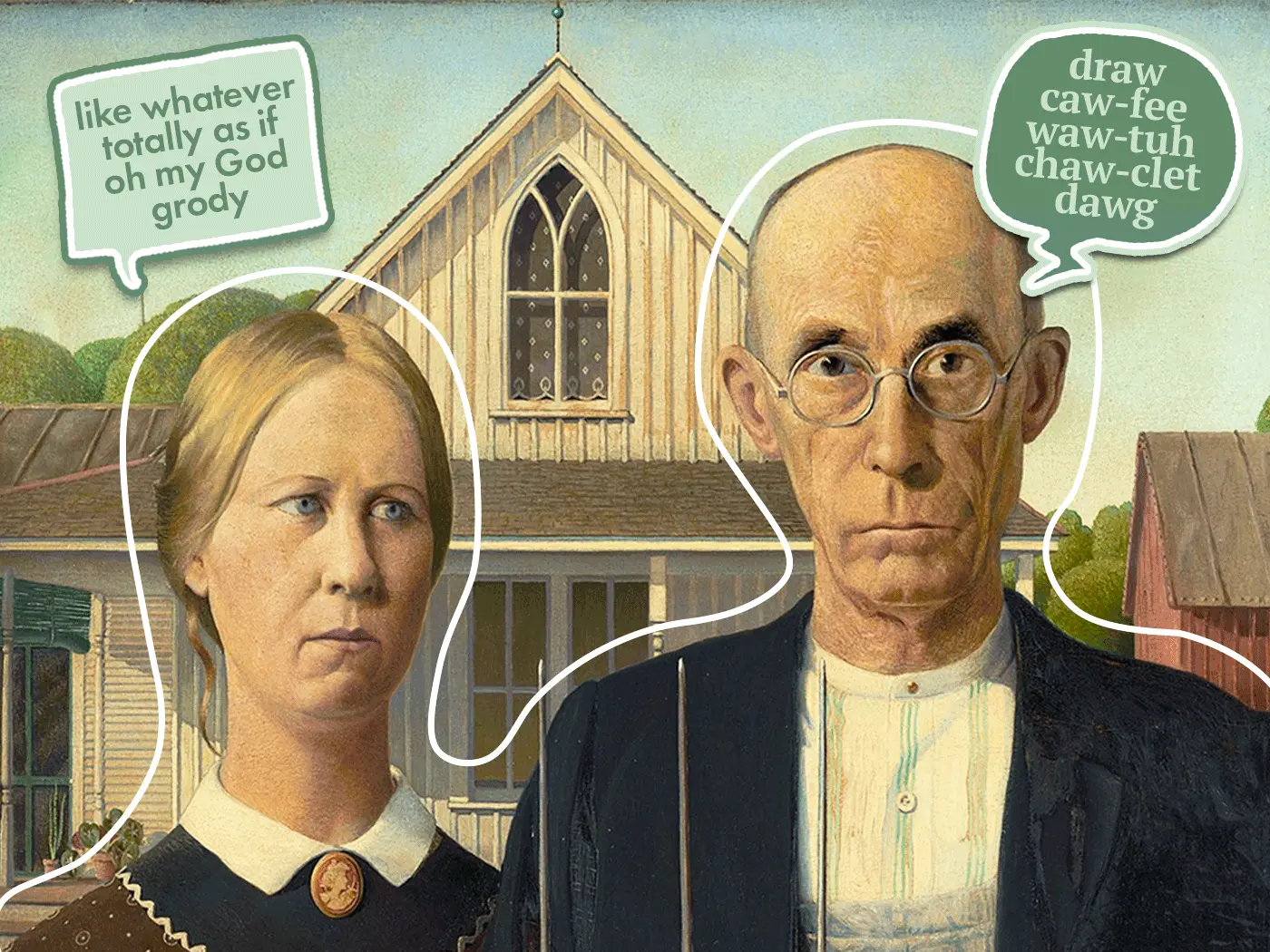linguistics
How One Man Discovered the Obscure Origins of the Word 'OK'
From Civil War biscuits to a Haitian port town, theories about the word's beginnings abounded
How the Memory of a Song Reunited Two Women Separated by the Trans-Atlantic Slave Trade
In 1990, scholars found a Sierra Leonean woman who remembered a nearly identical version of a tune passed down by a Georgia woman’s enslaved ancestors
A Brief History of the United States' Accents and Dialects
Migration patterns, cultural ties, geographic regions and class differences all shape speaking patterns
'Hallucinate' Is Dictionary.com's Word of the Year for 2023
In the context of artificial intelligence, the word means "to produce false information" and "present it as if true"
‘Rizz’ Is Oxford’s 2023 Word of the Year
The word means “style, charm or attractiveness” or “the ability to attract a romantic or sexual partner"
Merriam-Webster's 2023 Word of the Year Is 'Authentic'
As technology's ability to manipulate reality improves, we're all searching for the truth
A Brief History of the Letter 'X,' From Algebra to X-Mas to Elon Musk
A math historian explores how "x" came to stand in for an unknown quantity
Dictionary.com Adds More Than 300 New Words
Additions like “digital nomad,” “anti-fat” and “liminal space” reflect the dynamic nature of the English language
Three Pioneering Scholars Who Died This Year
They believed that the stories of marginalized communities were worth chronicling
'Goblin Mode' Is Oxford's 2022 Word of the Year
The term describes behavior that's "unapologetically self-indulgent, lazy, slovenly or greedy"
'Gaslighting' Is Merriam-Webster’s Word of the Year
Searches for the term, defined as the "practice of grossly misleading someone," skyrocketed in 2022
Two Hundred Years Ago, the Rosetta Stone Unlocked the Secrets of Ancient Egypt
French scholar Jean-François Champollion announced his decipherment of Egyptian hieroglyphs on September 27, 1822
Have Scholars Finally Deciphered a Mysterious Ancient Script?
Linear Elamite, a writing system used in what is now Iran, may reveal the secrets of a little-known kingdom bordering Sumer
Why Hitler and Stalin Hated Esperanto, the 135-Year-Old Language of Peace
Jewish doctor L.L. Zamenhof created Esperanto as a way for diverse groups to easily communicate
Where Did the Ancient Etruscans Come From?
A new DNA analysis suggests the enigmatic civilization was native to the Italian Peninsula
What Secrets Does This 1,800-Year-Old Carved Stone Hold?
The Tuxtla Statuette illuminates an endangered Latin American culture
Runes Found on Seventh-Century Cow Bone Could Change Slavic History
The Germanic writing suggests Slavs used an alphabet more than 200 years earlier than previously believed
Before He Wrote a Thesaurus, Roget Had to Escape Napoleon's Dragnet
At the dawn of the 19th century, the young Brit got caught in an international crisis while touring Europe
Who Invented the Alphabet?
New scholarship points to a paradox of historic scope: Our writing system was devised by people who couldn’t read
Father Reginald Foster Used Latin to Bring History Into the Present
Who speaks Latin these days? A surprisingly large number of people, thanks to the late friar, who died on Christmas Day at 81
Page 1 of 4
:focal(2325x1882:2326x1883)/https://tf-cmsv2-smithsonianmag-media.s3.amazonaws.com/filer_public/46/ac/46acacf5-7a03-4a0d-9bc7-8354071097f2/gettyimages-471329783.jpg)
:focal(787x340:788x341)/https://tf-cmsv2-smithsonianmag-media.s3.amazonaws.com/filer_public/c8/d4/c8d4c566-9ae3-456e-9321-de1df5ae1f7c/gullah.jpg)

:focal(1750x1167:1751x1168)/https://tf-cmsv2-smithsonianmag-media.s3.amazonaws.com/filer_public/f9/2c/f92c9d1b-4f91-4aa1-ab6c-4e310fbc471d/pexels-pixabay-267669.jpg)
:focal(640x494:641x495)/https://tf-cmsv2-smithsonianmag-media.s3.amazonaws.com/filer_public/f4/79/f4795a1c-4d96-4352-92c1-a9d02e3226e3/girl-2771936_1280.jpg)
:focal(3360x2240:3361x2241)/https://tf-cmsv2-smithsonianmag-media.s3.amazonaws.com/filer_public/33/54/3354888b-9d17-4646-a1ca-5622669ddba1/pexels-ivan-samkov-7676401.jpg)
:focal(700x527:701x528)/https://tf-cmsv2-smithsonianmag-media.s3.amazonaws.com/filer_public/20/9b/209bfdb0-336e-4e37-ad4c-8d44dca433e1/x.jpg)
:focal(1750x1167:1751x1168)/https://tf-cmsv2-smithsonianmag-media.s3.amazonaws.com/filer_public/4b/66/4b667b8b-1e65-4d52-9fe0-ddf28c9a8123/pexels-pixabay-267669.jpg)
:focal(800x602:801x603)/https://tf-cmsv2-smithsonianmag-media.s3.amazonaws.com/filer_public/d2/9a/d29aca99-12e2-45a7-b2c6-284b87d99efe/obitpioneeringscholars.jpg)
:focal(3976x2499:3977x2500)/https://tf-cmsv2-smithsonianmag-media.s3.amazonaws.com/filer_public/2a/06/2a062c56-2003-4d03-ba15-06e544414873/gettyimages-1384930584.jpg)
:focal(1500x1200:1501x1201)/https://tf-cmsv2-smithsonianmag-media.s3.amazonaws.com/filer_public/d9/67/d9674362-4049-4d73-a92b-6306e513b387/gettyimages-176567385.jpg)
:focal(700x527:701x528)/https://tf-cmsv2-smithsonianmag-media.s3.amazonaws.com/filer_public/54/66/546650fa-26a4-40fd-8d6d-5a7a04540f81/rosetta2.png)
:focal(700x527:701x528)/https://tf-cmsv2-smithsonianmag-media.s3.amazonaws.com/filer_public/25/6d/256d43a2-c068-4e59-9dea-0f6de8619dcc/elamite.jpg)
:focal(942x695:943x696)/https://tf-cmsv2-smithsonianmag-media.s3.amazonaws.com/filer_public/22/36/2236ad7a-00e9-4e12-964b-95630ed3763e/1920px-5-a_kongreso_de_seu_1931.jpeg)
:focal(2160x1625:2161x1626)/https://tf-cmsv2-smithsonianmag-media.s3.amazonaws.com/filer_public/17/7f/177ff89e-c6a1-4f84-bab0-4c2c1eafee9d/sleep_and_death_carrying_off_the_slain_sarpedon_cista_handle_400-380_bc_etruscan_bronze_-_cleveland_museum_of_art_-_dsc08259.jpg)
/https://tf-cmsv2-smithsonianmag-media.s3.amazonaws.com/filer/7b/ae/7baeec46-42ce-4a2f-8d3b-ef4de2c9a8b7/oct2021_e02_prologue-final.jpg)
:focal(572x405:573x406)/https://tf-cmsv2-smithsonianmag-media.s3.amazonaws.com/filer/d2/5a/d25a36e9-69b6-4749-8c5f-390da78a7d91/kost-1740x1160-80325225.jpeg)
/https://tf-cmsv2-smithsonianmag-media.s3.amazonaws.com/filer/ff/7f/ff7fa883-1977-4aff-9a12-ca4a0c683f96/roget.jpg)
/https://tf-cmsv2-smithsonianmag-media.s3.amazonaws.com/filer/c2/3b/c23bf45b-ccce-4f4f-a7b0-5dd5340d8414/untitled-1.jpg)
:focal(3114x1542:3115x1543)/https://tf-cmsv2-smithsonianmag-media.s3.amazonaws.com/filer/46/e3/46e38a4c-1c93-43ab-9664-91b7b3378354/reggie_bday_2019_2.jpg)